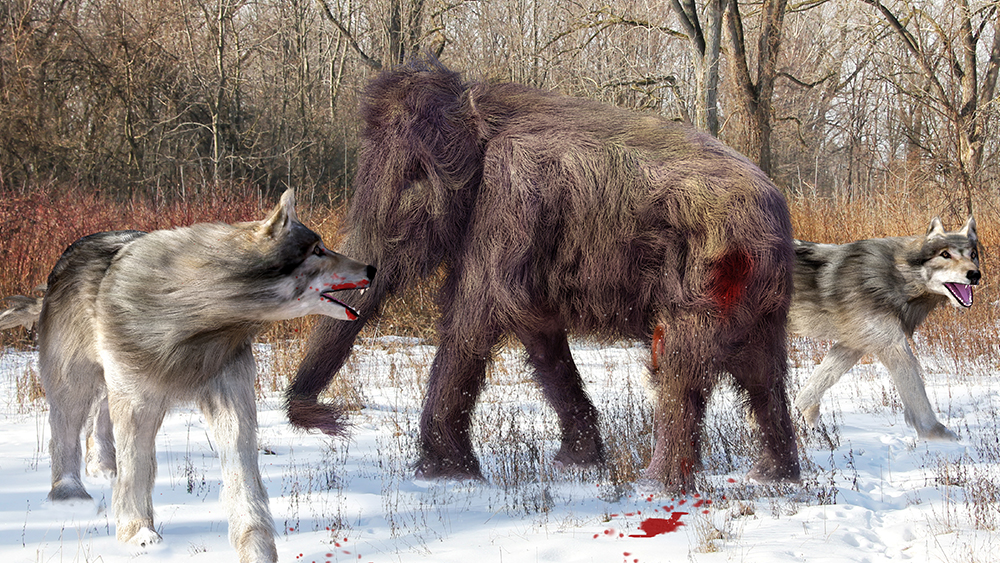There’s been much recent excitement about the birth of three dire wolf (Aenocyon dirus) puppies by a Dallas-based biotech company: Colossal Bioscience. This is because evolutionists state the dire wolf went extinct about 10,000 years ago.
Colossal CEO Ben Lamm stated, “Our team took DNA from a 13,000-year-old tooth and a 72,000-year-old skull and made healthy dire wolf puppies [named Romulus and Remus].”1
They then compared [the extracted DNA] to the genome of a gray wolf, among other living canids. The comparison revealed 20 differences in 14 genes linked to distinct dire wolf traits, including a larger size, wider head, bigger teeth and white fur.
The researchers edited gray wolf genes to match those characteristics, then inserted them into the egg cells of a domesticated dog, with the cells’ own DNA removed. The eggs developed into embryos, which were then transplanted into the wombs of large hound mixes, resulting in the births of Romulus and Remus in October, and Khaleesi in January [who has since died], all via cesarean section.2
The team made just 20 gene edits to the DNA samples, five of which produce light coats in grey wolves. In addition, the scientists used “a close relative of the dire wolf as the base.”3
Creationists openly question those inflated dates and ask if these really are dire wolf puppies. We suggest the dire wolf—large extinct canines—were survivors of the Flood about 4,500 years ago and lived in the Americas.4
Newsweek quotes a canine expert regarding Colossal Bioscience’s possible achievement:
“I would say such an animal is not a dire wolf and it’s not correct to say dire wolves have been brought back from extinction, it’s a modified gray wolf,” Anders Bergström, a professor at the University of East Anglia who specializes in the evolution of canines, said. “Twenty changes is not nearly enough. But it could get you a strange-looking gray wolf.”5
Dr. Bergström is not the only scientist that challenges these results. Wolf expert Dr. Julie Meachen is skeptical, “I don’t think they are actually dire wolves. I don’t think what we have is dire wolves,” Meachen told ABC News. “What we had is something new—we have a mostly gray wolf that looks like a dire wolf.”3
Correspondent Margherita Bassi of Smithsonian Magazine reported,
Dire wolf DNA is 99.5 percent identical to that of gray wolves, [Beth Shapiro, Colossal’s chief science officer] tells New Scientist’s Michael Le Page. But that 0.5 percent difference could consist of millions of base pairs. This raises the question of whether the pups are really dire wolves or just genetically modified gray wolves. Scientists not connected to the initiative point out that dire wolves might have countless other genetic differences that were not accounted for in the 20 changes made by Colossal’s team.2
Michael LePage of New Scientist was blunt, “Colossal Biosciences claims three pups born recently are dire wolves, but they are actually grey wolves with genetic edits intended to make them resemble the lost species.”6
As one can see, bringing back extinct animals is extremely difficult—even with “recent” creatures and good DNA samples. The challenges are compounded for larger animals, especially if their DNA is partial or badly fragmented. In other words, the possibility of resurrecting woolly mammoths, and especially dinosaurs, should be relegated to science fiction.
References
- Snider, M. Dire Wolf Returns from Extinction? Company Reveals ‘Magic’ It’s Using to Bring Back Species. USA Today. Posted on usatoday.com April 7, 2025.
- Bassi, M. Have Dire Wolves, Which Went Extinct More Than 10,000 Years Ago, Really Been Brought Back to Life? Smithsonian Magazine. Posted on smithsonianmag.com April 8, 2025. Schlosberg, J. et al. Scientists Say They Revived Dire Wolf Through Biotech Company’s De-Extinction Process. ABC News. Posted on abcnews.com April 7, 2025.
- Schlosberg, J. et al. Scientists Say They Revived Dire Wolf Through Biotech Company’s De-Extinction Process. ABC News. Posted on abcnews.com April 7, 2025.
- Hebert, J. 2013. Was There an Ice Age? Acts & Facts. 42 (12): 20.
- Afshar, M. Dire Wolf ‘Back From Extinction’—Could Woolly Mammoths, Dinosaurs Be Next? Newsweek. Posted on newsweek.com April 8, 2025.
- LePage, M. No, the Dire Wolf Has Not Been Brought Back from Extinction. New Scientist. Posted on newscientist.com April 7, 2025.
* Dr. Sherwin is a news writer at the Institute for Creation Research. He earned an M.A. in invertebrate zoology from the University of Northern Colorado and received an honorary doctorate of science from Pensacola Christian College.




















